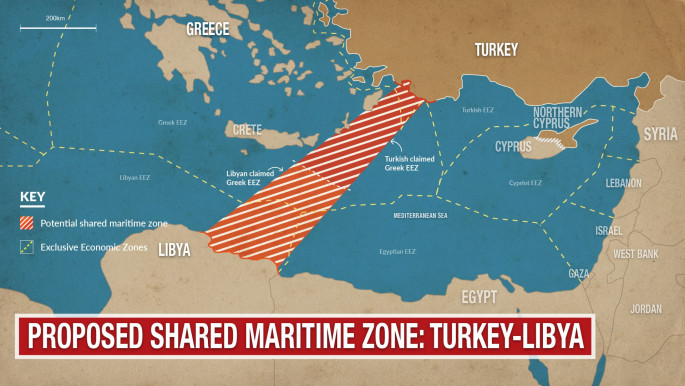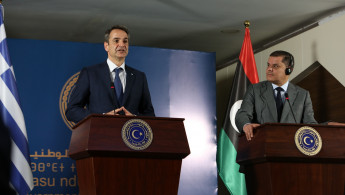Greek PM calls on Libya to cancel maritime deal with Turkey
During a visit to Tripoli on Tuesday, Greek Prime Minister Kyriakos Mitsotakis called for "the cancellation of illegal documents presented as agreements between states, even though they do not have any legal value".
Mitsotakis reopened the Greek embassy in Tripoli during his visit and announced that a consulate would open in the eastern city of Benghazi.
Most European countries closed their embassies in Tripoli due to the conflict in Libya but France and Malta also say they will reopen embassies soon.
Greece has always fiercely opposed the Libyan-Turkish maritime agreement, which was signed by the former Libyan Government of National Accord (GNA).
The GNA, which was internationally recognised and based in Tripoli, was formerly at war with a rival unrecognised administration based in eastern Libya and allied with strongman Khalifa Haftar.
Read also: Turkey and Egypt could negotiate maritime demarcation
It resigned last month to make way for a new government led by interim Prime Minister Abdul Hamid Dbeibah, who plans to unite Libya’s two rival administrations in accordance with a peace deal reached last year.
Greece became a key backer of the Haftar-allied east-based administration following the GNA-Turkey maritime boundary agreement. Turkey by contrast gave crucial support to the GNA in its conflict with Haftar, reportedly as quid pro quo for the maritime boundary deal.
The deal recognises Turkey's claims to an exclusive economic zone in the Mediterranean – something always opposed by Greece and Cyprus. France has also backed Greece in its dispute with Turkey.
Turkey’s efforts to explore the eastern Mediterranean for gas led to a dramatic rise in tensions with Greece and Cyprus.
Speaking in Tripoli, Mitsotakis expressed hope that "this new stage in our relations will allow us to correct and erase the errors made during the previous phase".
Dbeibah meanwhile said Libya was "ready to establish joint committees with Greece to resume discussions on maritime border demarcation and define the exclusive economic zone for each country between Crete and Libya".
"We emphasise the importance of all agreements capable of leading to appropriate solutions, while preserving the rights of Libya, Greece and Turkey," he added.
Agencies contributed to this report.
Follow us on Facebook, Twitter and Instagram to stay connected





 Follow the Middle East's top stories in English at The New Arab on Google News
Follow the Middle East's top stories in English at The New Arab on Google News
![Netanyahu furiously denounced the ICC [Getty]](/sites/default/files/styles/image_330x185/public/2024-11/GettyImages-2169352575.jpg?h=199d8c1f&itok=-vRiruf5)
![Both Hamas and the Palestinian Authority welcomed the ICC arrest warrants [Getty]](/sites/default/files/styles/image_330x185/public/2024-11/GettyImages-2178351173.jpg?h=199d8c1f&itok=TV858iVg)
